Rental Scale-Up’s take on Airbnb Winter 2023 Update
Airbnb’s Winter 2023 Release is a strategic move to intensify competition among hosts and maximize value for money for guests. This initiative suggests a drive towards higher quality offerings at more competitive prices. A key element of this strategy is the introduction of the “Guest Favorite” badge, challenging the established Superhost status and reshaping listing hierarchies in search results.
Airbnb is upping its game by giving hosts (upcoming) pricing tools loaded with market insights to help them set the right prices. But, there’s a catch – these tools seem to be gently pushing hosts towards lowering their prices. Plus, there’s a new twist: public reviews now disclose the ‘value for money’ score, adding another layer of pressure for hosts to think about their pricing.
We’re here to dissect Airbnb’s evolving strategy, especially considering the significant changes in their latest updates. For more detailed insights on each feature released, read our articles that delve into the new tools for Hosts here and what’s new on the Guest side here.
Moreover, Airbnb is strengthening its platform play, creating a more robust ecosystem where businesses ranging from professional co-hosts to cleaning services, and even smart lock companies, can thrive. This move not only enhances the platform’s functionality but also opens up new opportunities for businesses to grow in tandem with Airbnb.
For Airbnb hosts and vacation rental managers, understanding and adapting to these changes is crucial. Stay with us as we navigate through these developments, offering insights on how they can influence your hosting strategies and keep you competitive in Airbnb’s ever-evolving marketplace.
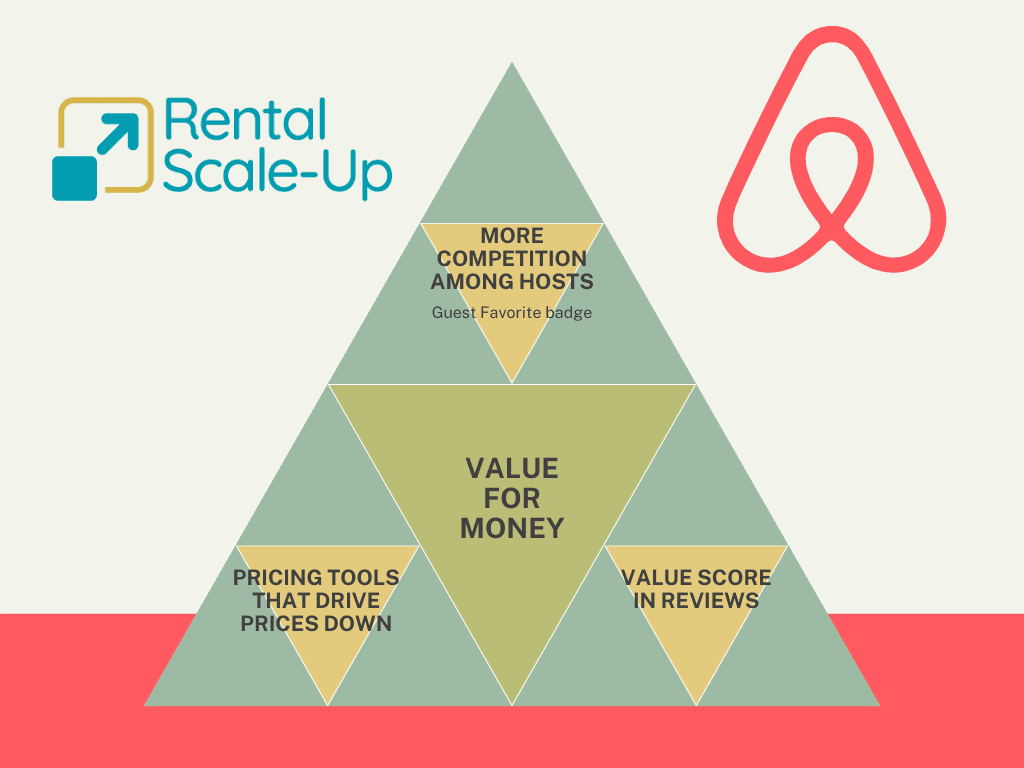
Context: Airbnb needs to change the perception that it is expensive + abundance of listings
The Winter 2023 Release is a crucial turning point for Airbnb, especially now when the platform is overflowing with options due to increased listings. At the same time, Airbnb is grappling with a pricing perception issue. There’s a growing buzz on social media about Airbnb being overly expensive, a concern that CEO Brian Chesky has acknowledged and predicts will take until 2024 to address. The goal of this release is clear: ramp up competition among hosts to enhance the value guests get — essentially, more quality at the same or even lower prices.
How the updates of 2023 Winter Release helps driving listing quality up
For a detailed overview of the Guest Favorite badge, read our article about the new guest tools.
The new “Guest Favorite” badge increases the quality competition among hosts (and turns the “Supherhost” badge from top dog to second best)
The introduction of the Guest Favorite badge on Airbnb represents a shift towards a more granular and immediate recognition of listing quality based on guest feedback.
Differences Between Guest Favorite and Superhost Status:
Listing vs. Host Level:
- Guest Favorite: This badge is awarded to individual listings, not to the host’s overall account. It’s based on specific guest experiences at a particular property.
- Superhost: This status is awarded to the host’s entire account, recognizing the host’s overall performance across all their listings.
Criteria:
- Guest Favorite: The badge is based on a combination of high guest ratings (above 4.9 stars on average), a significant number of positive reviews (at least five), and a track record of reliability (with Host cancellations and quality-related issues being very low, around 1% on average).
- Superhost: This status requires a minimum number of completed trips (10 trips or 3 reservations totaling at least 100 nights), a high response rate (90% or higher), a low cancellation rate (less than 1%), and a high overall rating (4.8 or higher).
Update Frequency:
- Guest Favorite: The badge is updated daily, offering a dynamic and current reflection of a listing’s standing with guests.
- Superhost: The status is evaluated quarterly, making it a less frequent but more stable indicator of host quality.
Visually, “Guest Favorite” is stealing the show from “Superhost”
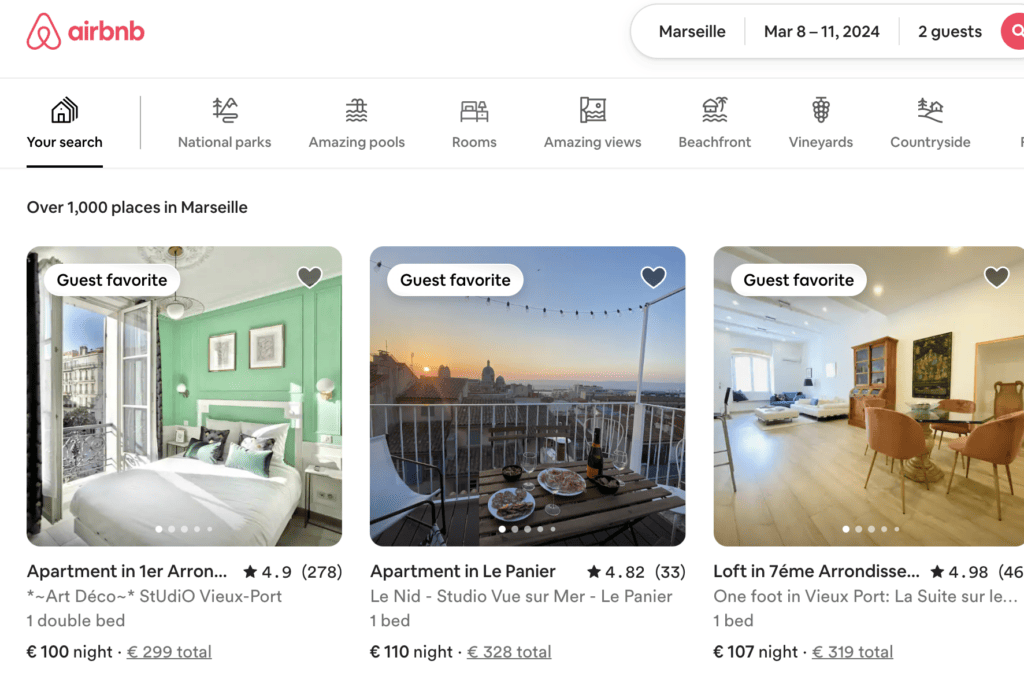

Why “Guest Favorite” May Eclipse “Superhost” in Search Results:
- Visibility: In search results, the Guest Favorite badge is displayed prominently, making it a clear and distinct sign of excellence for that specific listing. It’s designed to catch the eye of guests browsing through numerous options.
- Specificity: While the Superhost status is a broad indicator of a host’s overall quality, the Guest Favorite badge is a direct endorsement of a particular listing’s excellence. This specificity can be more influential when guests are comparing similar options.
- Superhost as second best: If a listing is a Guest Favorite and the host is a Supethost, then it is the Guest Favorite badge that is displayed in results If a listing does not qualify for “Guest Favorite” but its host is a Superhost, then the Superhost is displayed in search results.
Quality of listing content and photos goes up with new Listings tab
Airbnb’s latest updates are designed to encourage hosts to frequently update their listings and organize their photos effectively, as these actions have been shown to significantly enhance listing quality and increase bookings. The new Listings Tab makes it simpler for hosts to add details and new amenities, with the platform offering optimization tips for more intuitive editing. This is vital for maintaining listings that accurately reflect what guests will experience, especially as Airbnb regularly adds new features that hosts need to incorporate.
Additionally, the AI-powered Photo Tour now automates the organization of property photos, creating a more engaging virtual walk-through for guests. This not only makes Airbnb’s app and website more appealing to browse but also helps in increasing booking conversions. The integration of these features demonstrates Airbnb’s commitment to providing a seamless experience for both hosts and guests, ultimately leading to better reviews and higher conversion rates.
Value for money: How the 2023 Winter Release updates help drive prices down
Upcoming pricing tools that could persuade hosts that they’re too expensive (even if demand could support high prices)
Airbnb’s Winter 2023 update introduces two significant features aimed at enhancing price transparency and competitiveness among hosts: the ‘Compare Prices in the Calendar’ feature and the ‘Pricing Visibility’ update. Note that these features are not available yet to hosts. Here’s a breakdown of these features and their potential impact on hosts’ pricing strategies.
Compare Prices in the Calendar Feature:
- Functionality: Will allow hosts to view the average prices of similar listings in their area directly within their calendar.
- Criteria for Comparison: The comparison will be based on factors like location, size, amenities, ratings, reviews, and guest behavior.
- User-Friendly Access: Previously available but not integrated in the calendar, this feature will be more visible and accessible.
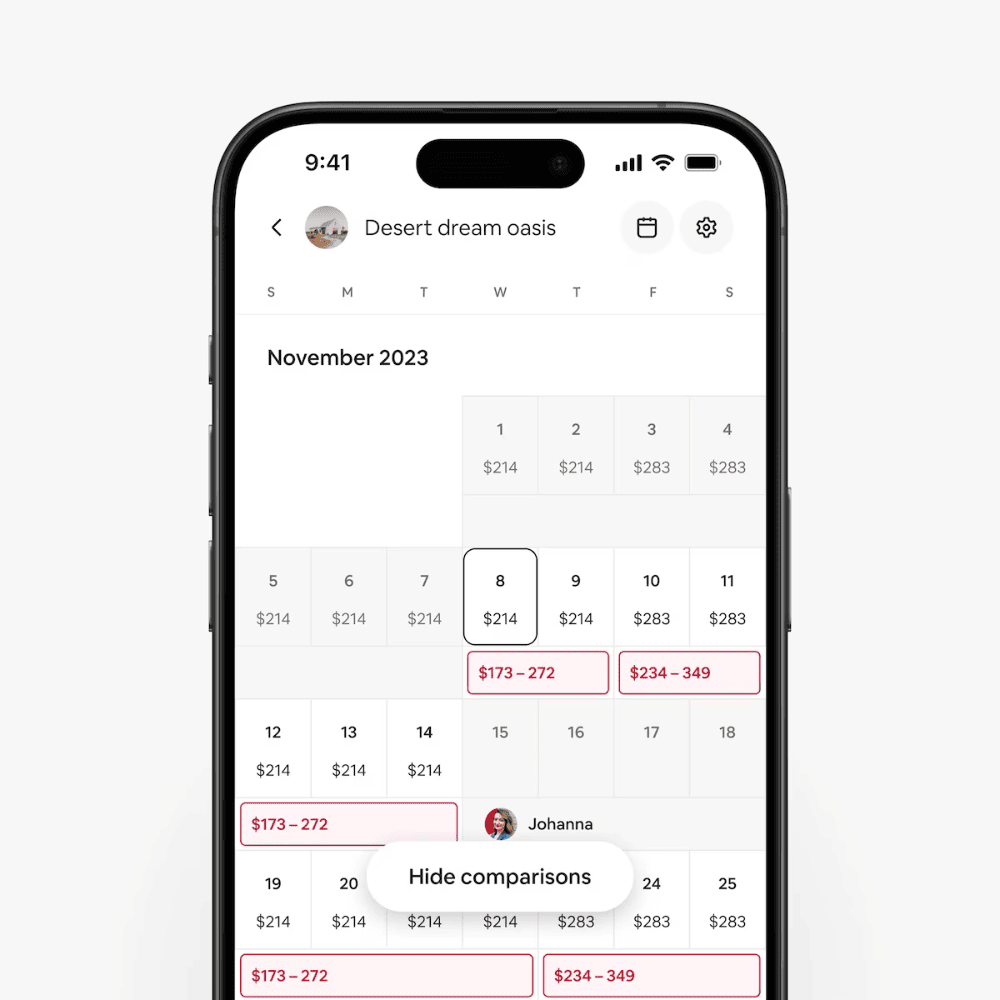
Pricing Visibility Feature:
- Change in Price Display: With their calendar, Hosts will see prices that include service fees and taxes, aligning with what guests pay.
- Automatic Implementation: Requires no action from the hosts.
- Rationale: Aims to provide consistency between the price hosts set and the price guests see.
Impact of These Features on Hosts’ Pricing Decisions:
Airbnb’s updates are designed to subtly nudge hosts towards adjusting their prices, especially if they find their rates higher than their immediate competitors or inclusive of additional taxes and fees.
- Encouraging Price Matching:
- The ‘Compare Prices’ feature makes it easier for hosts to see how their prices stack up against others, potentially leading to price matching.
- This could initiate a trend where hosts lower prices to stay competitive, especially if they observe their offerings are priced higher than similar listings.
- Perception of Higher Listing Costs:
- With the ‘Pricing Visibility’ feature showing all-inclusive prices, hosts might perceive their listings as more expensive.
- This could prompt them to lower their base rates to make their listings appear more appealing and competitively priced to potential guests.
- Risk of Suboptimal Pricing:
- The combination of these features could lead to a ‘race to the bottom’, where hosts continually undercut each other, potentially harming profit margins.
- There’s a risk of focusing too much on price, overlooking other value aspects like quality, unique experiences, or additional services.
Value Score Now Included in Review Ratings, Could Pressure Hosts to Lower Prices for Higher Scores
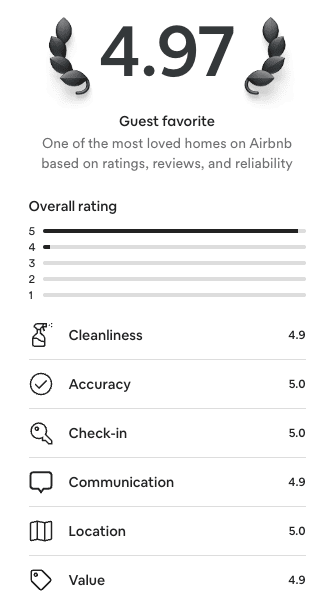
Before the 2023 Winter Release, guests only score a global score for the reviews of a listing. When reviewing a stay, a guest did score the listing on all these dimensions, but it was only shown to the host, not to future guests.
Now, all the scores are shown, from cleanliness to communication. Value, i.e. value for money, is also displayed. This may trigger guests to avoid listings with a value score not close to 5.0. Yet, in terms of optimal pricing, it could be argued that a host with a perfect 5.0 on value is probably underpricing their property. Making the value score public is also a way to pressure prices down.
By focusing on these aspects, Airbnb can enhance the overall value for money of its listings and platform, thereby attracting more users and increasing satisfaction among both guests and hosts.
How the 2023 Winter Release prepares for the big 2024 release: New Marketplaces for Airbnb
Airbnb’s latest updates and features, including those for co-hosting and smart lock integration, signify a strategic move towards extending its platform play. This direction is not just about enhancing the existing functionalities but also about laying the groundwork for a broader ecosystem. This ecosystem is poised to cater to a wide range of individuals and companies, including cleaners, co-hosts, and smart lock providers. Here’s a breakdown of how Airbnb is setting the stage for a more extensive marketplace and ecosystem:
- Creating a Marketplace of Services for Hosts:
- 2024 Outlook: Airbnb is reportedly gearing up to launch a comprehensive “Marketplace of Services” for hosts in 2024. This marketplace is anticipated to encompass a variety of vacation rental tech software and services, going beyond just lodging listings.
- Integration of Smart Locks: The current focus on smart lock integration is a step towards including vacation rental tech as part of Airbnb’s service offerings. This integration simplifies property management and enhances security, making the platform more attractive to tech-savvy hosts.
- Support for Host Operations: By incorporating technology and services that aid in property management, Airbnb is positioning itself as a one-stop solution for hosts, streamlining their operations and potentially reducing their reliance on external tools or services.
- Co-Hosting Marketplace – A Quiet Expansion:
- Less Publicized, Yet Essential: While not heavily publicized, the expansion of the co-hosting program is a significant move. It indicates Airbnb’s recognition of the importance of co-hosting in its ecosystem, especially for hosts who need operational support.
- Diverse Roles of Co-Hosts: Co-hosts on Airbnb can range from individuals handling specific tasks like cleaning to full-fledged property management companies. This diversity allows for a wide range of services and support levels to be offered within the Airbnb platform.
- Seamless Integration: Updates like direct messaging and flexible payout options for co-hosts enhance the functionality of the platform, making co-hosting more integrated and efficient.
- Strategic Implications:
- Building a Comprehensive Ecosystem: These developments are part of Airbnb’s strategy to build a comprehensive ecosystem where individuals and companies can create and grow their businesses, relying heavily on Airbnb’s platform.
- Attracting a Wider Audience: By offering a range of services and technologies, Airbnb can attract a broader audience, including those who might not have considered short-term rentals due to operational challenges.
- Strengthening Market Position: These moves also solidify Airbnb’s position in the market, not just as a lodging platform, but as a comprehensive solution provider in the vacation rental industry.
What Airbnb has not rolled out in 2023 but is supposed to be cooking
At a recent Skift conference, Brian Chesky hinted at:
Sustainable Home Certification
Airbnb’s CEO said the company was busy developing a certification to let guests know when a listing is sustainable.
A peer-to-peer car rental marketplace?
In a recent Financial Times article, Brian Chesky seems to have been musing about car rentals. According to the newspaper, he “highlighted a “long list of ideas” under consideration, including rental cars and dining pop-ups”. “The second biggest asset usually in someone’s life after their home is their car,” he said, and Airbnb has long considered a pivot to car rental. “That’ll be the next thing,” he said.
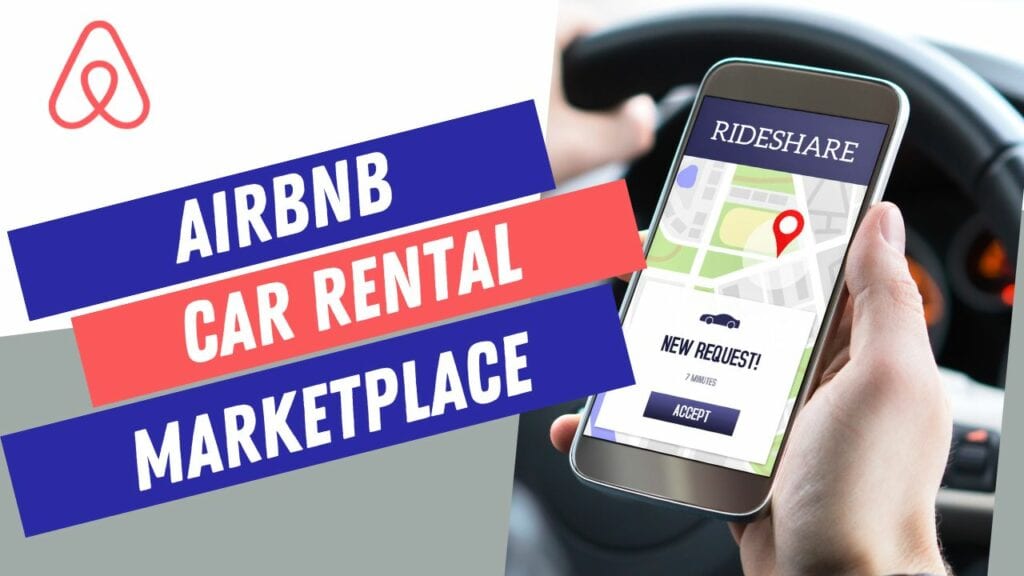
Airbnb’s potential venture into the car rental space aligns with its sharing economy model. However, developing and launching such a platform could take time, with a possible launch not expected before 2024.
It’s important to note that platforms like Turo and Getaround already operate in this space, offering peer-to-peer car-sharing services. They have demonstrated the viability of this business model but also represent competition for Airbnb.
Airbnb’s potential expansion into car rentals could be structured similarly to its successful home-sharing model:
- Peer-to-Peer Approach:
- Home Sharing: Airbnb’s existing model allows homeowners to rent out their properties or rooms, bypassing traditional hotel accommodations.
- Car Sharing: In the same vein, Airbnb could enable car owners to rent their vehicles directly to those needing transportation, offering a more personal and potentially affordable experience.
- Sharing Economy Principle:
- Home Sharing: Airbnb thrives in the sharing economy, where individuals monetize their underused assets, such as homes.
- Car Sharing: Consistent with this concept, Airbnb could incorporate car rentals into its platform, facilitating vehicle owners to monetize their underutilized cars.
- Optimization of Assets:
- Home Sharing: Airbnb enables homeowners to earn from spaces that are vacant for some parts of the year.
- Car Sharing: As highlighted by Brian Chesky, cars are a significant asset that often sit unused. Airbnb could create a platform for these vehicles to be better utilized, providing an income stream for owners.
- Entrepreneurial Opportunities:
- Home Sharing: Some hosts have transformed their Airbnb listings into full-scale businesses, managing multiple properties and enhancing guest experiences.
- Car Sharing: Similarly, individuals could start by renting out one car and gradually grow to manage a fleet, creating a thriving business on Airbnb’s platform.
- Challenges and Potential Risks:
- Home Sharing: Hosts face issues like property damage, disruptive guests, and legal implications.
- Car Sharing: Car hosts would encounter challenges such as vehicle damage, theft, or misuse. Airbnb would need to establish a comprehensive system to manage these issues, similar to its home rental model.
- Growth and Diversification:
- Home Sharing: Airbnb began with home rentals but diversified to include experiences, enabling travelers to book local activities.
- Car Sharing: As suggested by Chesky’s “long list of ideas,” Airbnb could expand its car-sharing platform to include guided tours using the rented vehicle.
In summary, Airbnb’s potential venture into car rental would be a logical progression of its current model. By capitalizing on its knowledge of the sharing economy, asset optimization, and fostering entrepreneurial opportunities, Airbnb could establish a thriving car-sharing marketplace akin to its home-sharing triumph.








